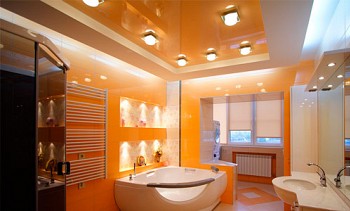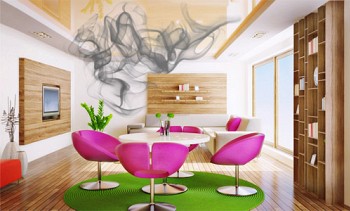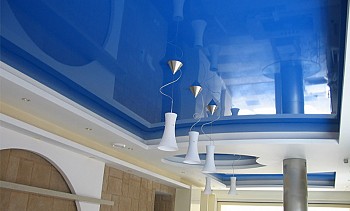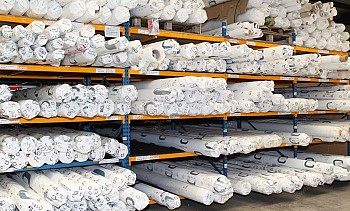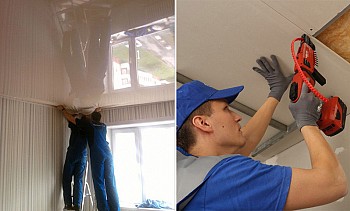Stretch ceilings - the pros and cons of fabric and PVC paintings
These ceiling finishes are increasingly becoming part of our lives - they are installed very quickly, they look beautiful and do not require surface preparation. So, today on the agenda are stretch ceilings, the pros and cons of which we will consider in detail.
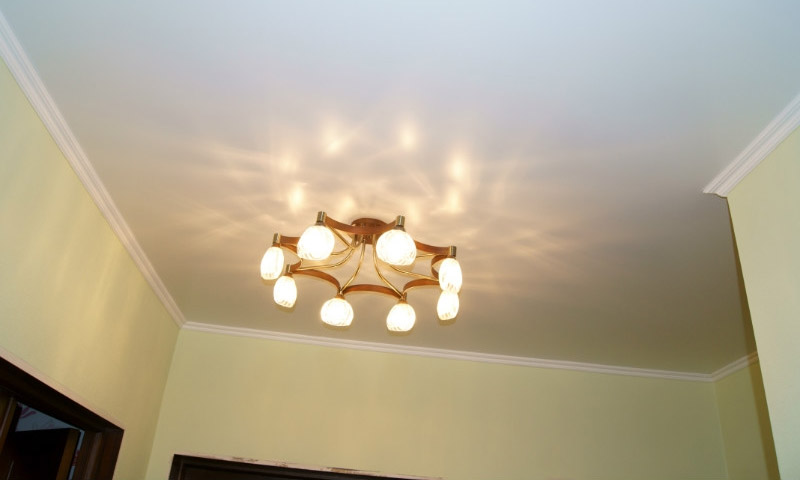
Content:
Advantages of suspended ceilings
Two of the materials from which stretch ceilings are made are PVC film and a woven fabric. Since these materials have slightly different characteristics, the advantages and disadvantages of these stretch ceilings will also vary slightly, we will take this into account when describing their pros and cons.
- For more information about the types of suspended ceilings, see the material: What are the types of suspended ceilings.
Long service life
This, of course, is a significant plus. Typically, such ceilings manufacturers guarantee from 10 to 15 years of service. But in fact, experience has shown that the real life is much longer. A high-quality product neither loses color nor technical characteristics. For comparison, we take a painted ceiling made of drywall - after all, after a couple of years it will have to be tinted, and in the case of stretch ceilings, you only need to perform surface cleaning from time to time.
Safety and environmental friendliness
Judging by the fact that European apartments are universally equipped with such ceilings, they do not pose any health hazard. You understand - there things are monitored strictly there. A little bit wrong - forbidden. Well, the fact that the film is made of polyvinyl chloride does not mean at all that it can be harmful - today even children's toys are made of PVC. However, when purchasing a suspended ceiling, still check whether its certificate meets European standards. And then after all, now it is very easy to run into a Chinese fake. And this is the main problem by which this advantage of suspended ceilings turns into a disadvantage.
Quite reasonable price
At the very beginning, when such ceilings only appeared, they cost much more. Time passed, manufacturers became quite a lot, respectively, and the price of suspended ceilings fell. And now, once again comparing them with suspended plasterboard ceilings, we often get the total cost lower for tension structures. Indeed, for them, in addition to the canvas, no materials will have to be purchased. But for a suspended ceiling, in addition to plasterboard sheets, a profile is needed, and paint with putty.
But: trying to save money, do not fall for the tricks of dishonest sellers. They sometimes give out fakes from China for the products of popular brands. And they lure customers with ultra-low prices, assuring that they are so thanks to promotions and discounts. Therefore, if the product is suspiciously cheap, carefully check it (or bypass).
Dampness is not an obstacle for a stretch ceiling
If the bathroom is not the best ventilation, then neither paint nor wallpaper on the ceiling will last long. A plasterboard ceiling will often have to be refreshed. But the ceiling from a tightly stretched PVC film is not afraid of moisture, not at all spoiling from it. Not only that - even a few buckets of water spilled from above by sloppy neighbors will withstand such a film. True, this advantage does not apply to fabric stretch ceilings.
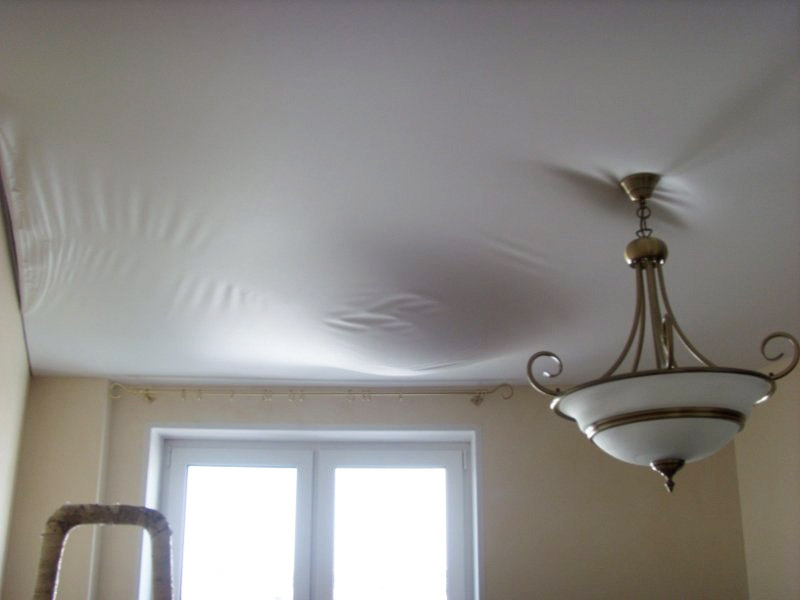
PVC ceiling, which is flooded with water from above, after pumping out water and carrying out repairs, in most cases, will be suitable for operation.
Care is easy
Well, yes - you don’t have to tint or change any elements for all 15 years (coverage will last no less than this period). It will be enough to regularly wipe the ceiling surface with a soft cloth. There will be pollution - use a detergent. For PVC ceilings, a glass cleaner can also be used, but not the one containing alcohol.
Allows to hide the base and engineering structures
Wiring, ventilation, alarm, fire detectors - all this can be reliably hidden under the stretched plane of the ceiling. By the way, the fact that the original surface does not require absolutely any finish is no less important. It can be covered with wallpaper, old peeling paint or even whitewashed - it does not matter for a stretch ceiling. And yet: between the film and the base, if necessary, you can place a heat insulator or sound insulator, which also will not be visible from the room.
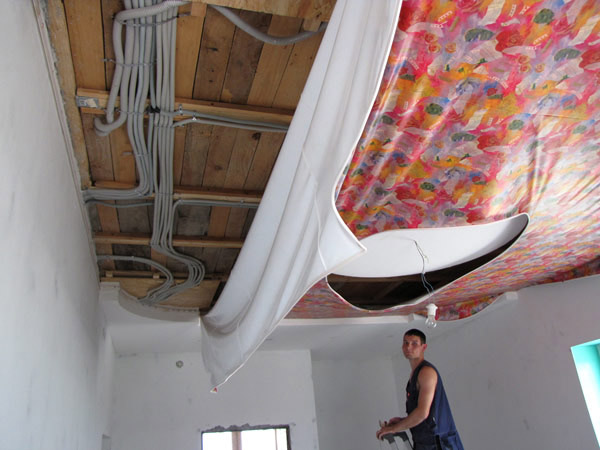
Variety of assortment and design options
Oh yes - those who browse catalogs with suspended ceilings sometimes just take their breath away. So many colors and shades, so many textures, so many shapes - you can’t take your eyes off. The night sky with stars and clusters of planets or a glossy mirror ceiling of deep color looks amazing. Silky satin surface or classic matte will suit those who like comfort and tranquility. And textures such as suede, metallic or marble look rich and elegant.
Important: do not neglect the services of a designer. He will help you choose exactly what is best for your home - because he knows all the laws of compatibility of textures and colors.
Installation - no more than 5 hours
You can’t mount a ceiling so fast. And if a simple canvas is stretched to one level, then three hours will be enough. We will take into account the fact that there will be no construction debris during the installation of suspended ceilings. They can be mounted in a room where repairs have already been made, there is furniture and wallpaper on the walls. The main thing - 0.6 meters from the wall for freedom of movement to the master leave.
But: when installing ceilings made of PVC film, nevertheless, remove furniture, especially expensive furniture. It is better not to risk it when working with a heat gun.
Drawbacks of Stretch Ceilings
Durability - not at all up to par
Unfortunately, it is extremely easy to pierce a thin film of polyvinyl chloride with something sharp. Therefore, in rooms with such ceilings, you must be careful with the movement of tall pieces of furniture. And during the holiday, a danger from champagne can be a danger, booming vertically uphill. Yes, and "darts" do not indulge, as well as shoot on the ceiling with toy bullets. However, fabric cloths, unlike PVC, have higher strength.
Complete tightness
This quality, on the one hand, is a plus. Indeed, it is thanks to him that a stretch ceiling can save a room from a "flood". But many people think that all surfaces of the room (including, of course, the ceiling) should “breathe”. Naturally, this will not happen in the case of PVC ceilings. As for fabric stretch ceilings, they are devoid of this disadvantage and perfectly pass air.
The presence of seams
This drawback is not so noticeable, except that you look closely (naturally, if the ceiling is of high quality). However, in a room up to 5.1 meters wide, you can find a fabric seamless ceiling. Seamless PVC ceilings can be found for rooms up to 3.5 meters wide. As you can see, the presence of this small drawback will depend on the type of canvas used and the size of your room.
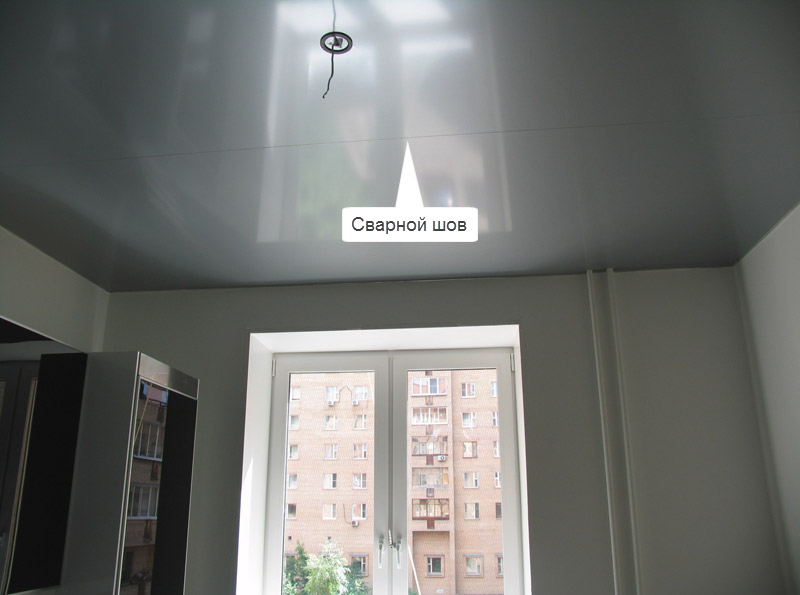
Seams on matt PVC ceilings will be even more noticeable.
Odor
A new stretch ceiling may smell a little like a new jacket or pair of shoes. Several days pass - and there is no trace of this smell. But if this is not so, then there is reason to think about it. An unpleasant “chemical” aroma that does not weather for a long time may indicate that you have a fake of low quality.As mentioned above, before buying, be sure to ask the seller for a certificate.
Do not mount the suspended ceiling yourself
Unfortunately, this is absolutely true. You will have to pay the specialists who will install. But let's look for pluses here. Let it be necessary to part with the nth amount of money, but time it can be spent on something more pleasant. In addition, the installation will take some three or five hours. Again, if you entrust the matter to reliable specialists, you will be able to avoid the troubles described below.
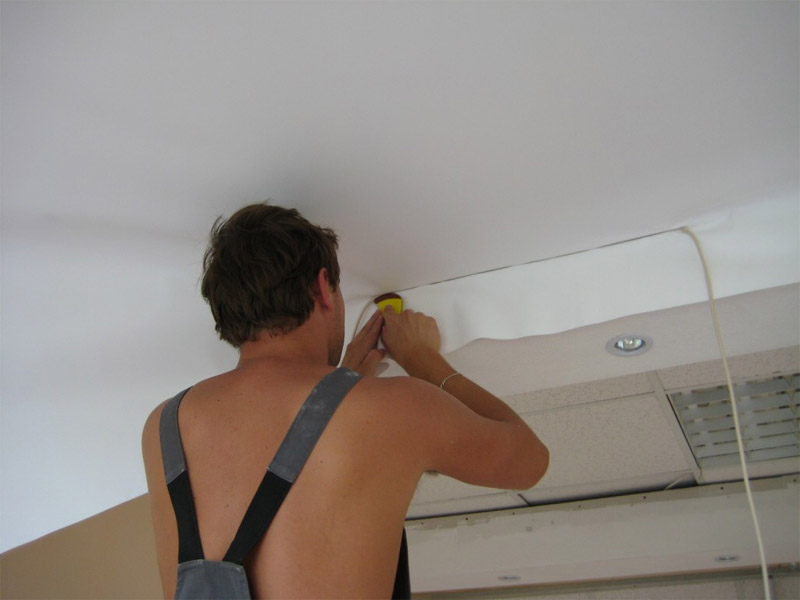
What can happen if the stretch ceiling is not installed correctly
Collapse, swim or tear off the canvas
A woe-master, who does not know how to work with stretch sheets, can get completely unexpected results:
#1. Collapse is a common drawback when using PVC canvas. This means that with every knock on the door, the web folds. To get rid of this effect, you need to equalize the pressure in the room and under the ceiling. By the way, a good master knows about this. As a matter of fact, manufacturers do not make this secret, providing for the need for equalization of pressure.
#2. When the ceiling height, power and lighting angle are determined approximately during installation, the PVC film may melt. But if you carefully study the technology, you can see that these parameters are strictly defined in it. No need to experiment with fixtures once again, and then everything will be fine.
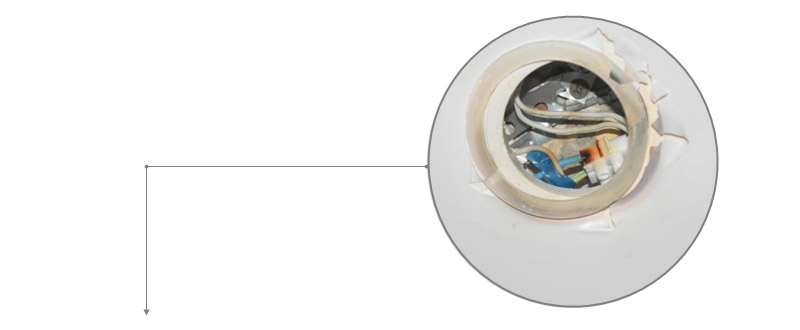
An example of improper installation of the backlight, in which the PVC fabric not only melted, but also cracked from exposure to high temperatures.
#3. When attaching the ceiling to plasterboard sheets, tearing may occur. But this will happen only if the structure is not reinforced with a scarf or beam. You just need to know that GCR cannot bear the load of 70 kilograms per meter (linear).
Canvas sagging
If the installation of the canvas is not performed qualitatively, then it may sag. The sagging ceiling does not look very aesthetically pleasing. There may be several reasons for this: poor-quality seams, weak tension, poor knowledge of technology. Especially often this happens after the bay from above. If you turn to specialists in time, the after-sales service will be able to restore smoothness and beauty to the ceiling. You see - one more argument against self-assembly.
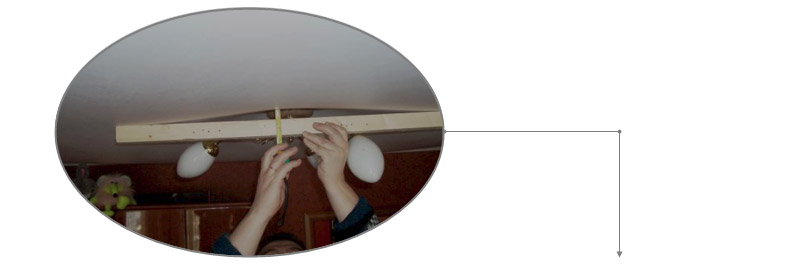
In this example, the PVC fabric sagged very much.
Features of stretch ceilings made of fabric and PVC film
PVC ceilings, as already mentioned, are very unstable to various mechanical damages. These are punctures, cuts, breakouts from blows. In addition, the PVC film is “panicky” afraid of low temperatures. When cooled below zero, it becomes more fragile, and when the frost rises to minus 20 degrees, it completely collapses.
If you opt for a stretch-type ceiling made of fabric, you can not be so afraid of breaking it through, piercing it or cutting it through. The fabric is much stronger. And she is not afraid of frost, and a heat gun when stretching the ceiling is not needed. And the fabric can be dyed, and up to ten times. However, the disadvantages of such a ceiling will be:
- It can not be washed with detergents, and it is more difficult to care for it than for a ceiling made of film.
- Its moisture resistance is lower than that of polyvinyl chloride. And after flooding the ceiling, it is not always possible to return to its original form.
- The palette of colors compared to PVC ceilings is much poorer.
- Unfortunately, this type of ceiling is disposable. When replacing it, you will have to change the entire frame.

